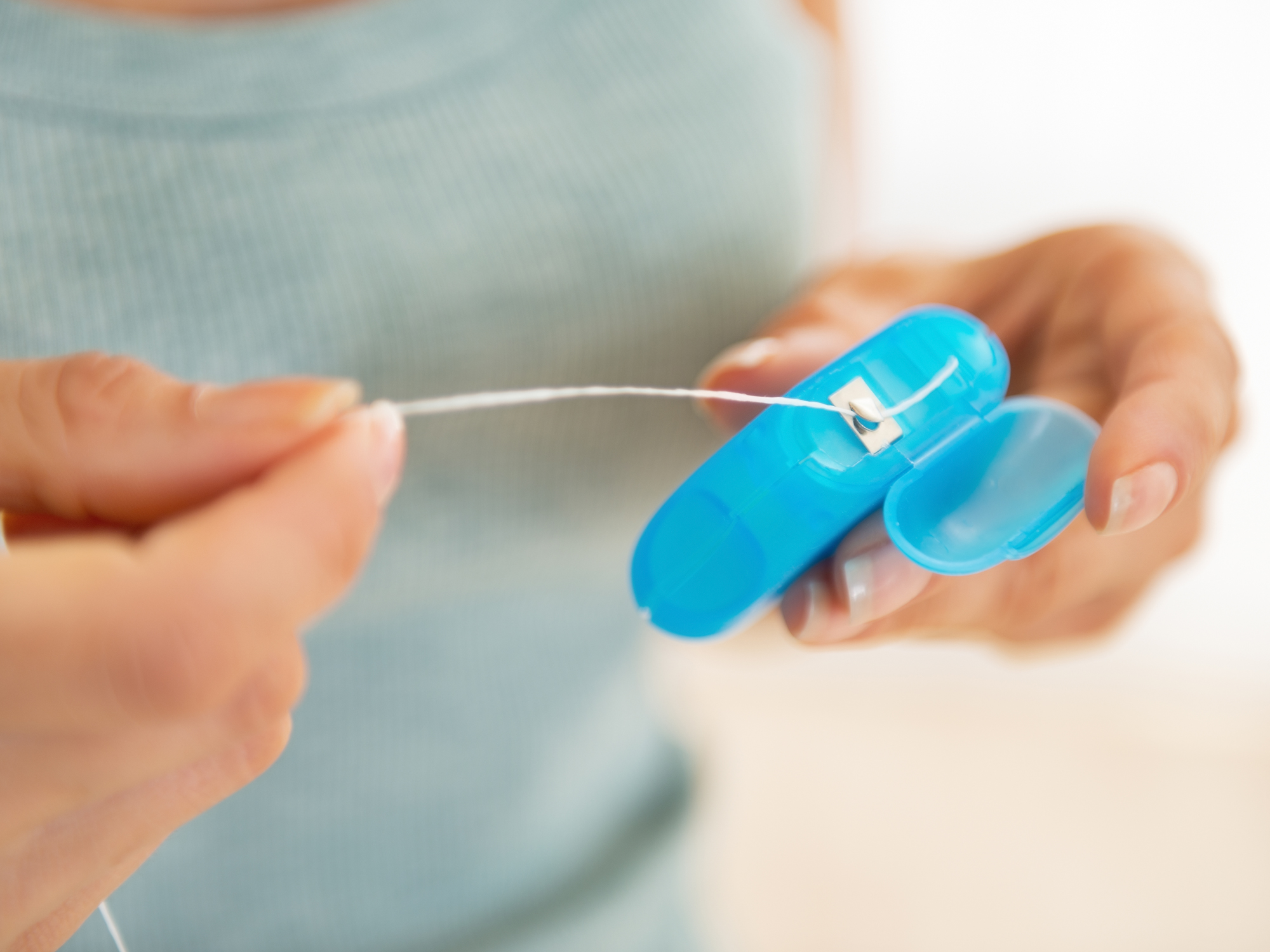Get Easy Health Digest™ in your inbox and don’t miss a thing when you subscribe today. Plus, get the free bonus report, Mother Nature’s Tips, Tricks and Remedies for Cholesterol, Blood Pressure & Blood Sugar as my way of saying welcome to the community!
The dirty little secret hiding in your dental floss

Good hygiene is hammered into us from a young age…
As toddlers, we’re taught to wash our hands and brush our teeth. As kids, we learn about regular bathing and hair washing. As adolescents, we learn about deodorant and hair removal.
Many of us continue these hygiene habits until the day we die because we’re taught that keeping clean and well-groomed shows we care for our bodies and prevents illness.
Now, I’m all for taking good care of yourself. But sometimes our basic hygiene habits can backfire on us…
That’s because many of the modern products we use in our daily hygiene rituals contain chemical ingredients that harm us rather than clean us.
Problem is, we’re so accustomed to using these products daily to stay “clean” and “healthy” that we might never suspect that they contain anything bad. Case in point?
Dental floss.
A new study shows that certain types of dental floss contain a toxic chemical linked to health problems like cancer, thyroid disease, high cholesterol, low birth weight, fertility issues and a sluggish immune system.
The dental floss that exposes you to toxic chemicals
A study conducted by the Silent Spring Institute and the Public Health Institute in Berkeley, CA uncovered an alarming ingredient in certain dental flosses…
Per- and Polyfluoroalkyl Substances (also known as PFAS chemicals).
The study included 178 middle-aged women enrolled in the Public Health Institute’s Child Health and Development Studies, a multigenerational study of the relationship between environmental chemicals and disease.
Researchers took blood samples from these women to test for 11 PFAS chemicals. PFAS chemicals are used in a variety of products to repel oil and water. You’ll find them in food packaging, fabrics, carpeting, cookware and more.
Researchers also asked women how frequently they performed nine behaviors that expose them to more PFAS chemicals. And one of these behaviors made women much more likely to have high levels of a PFAS called PFHxS (perfluorohexanesulfonic acid) — flossing with Oral-B Glide dental floss.
Researchers tested 18 types of dental floss, including three Oral-B Glide products, for the presence of fluorine. If a product tests positive for fluorine, it’s a good sign it contains PFAS chemicals. All the Oral-B Glide products contained fluorine.
Generic knock-offs of Oral-B Glide products tested positive for fluorine too. These products had labeling that read: “compare to Oral-B Glide.” Another non-Glide product that contained fluorine, described itself as a “single strand Teflon fiber.”
Now, I don’t know about you, but the last place I want Teflon and other PFAS chemicals is my dental floss. And scientific studies support my skepticism about the safety of these chemicals. They’ve been linked to a wide range of health problems, including kidney and testicular cancer, thyroid disease, high cholesterol, low birth weight, decreased fertility, and effects on the immune system.
So, what can you do to protect yourself?
Find floss that’s PFAS-free, of course.
Reducing your exposure to PFAS chemicals
I have one more piece of bad news…
Flossing wasn’t the only behavior putting women at risk for high PFAS levels in this study. Other risky behaviors included:
- Having stain-resistant carpet or furniture
- Living in a city served by a PFAS-contaminated water
- Eating prepared food in coated cardboard containers, like French fries or takeout. Although, this risk factor only applied to African American women.
So, these are a few behaviors to be aware of in your own life. Avoid those stain-resistant options when your furniture shopping. Get your water tested to see if it contains PFAS chemicals. If it does, invest in a good water filter. Eat less takeout. And, of course, check your dental floss. There are plenty of natural flosses on the market that are PFAS-free, including flosses coated with safe ingredients like beeswax and tea tree oil rather than chemicals.
Editor’s note: Have you heard of EDTA chelation therapy? It was developed originally to remove lead and other contaminants, including heavy metals, from the body. Its uses now run the gamut from varicose veins to circulation. Click here to discover Chelation: Natural Miracle for Protecting Your Heart and Enhancing Your Health!
Sources:
- Basic Information on PFAS — United States Environmental Protection Agency
- Dental flossing and other behaviors linked with higher levels of toxic chemicals in the body — MedicalXpress














